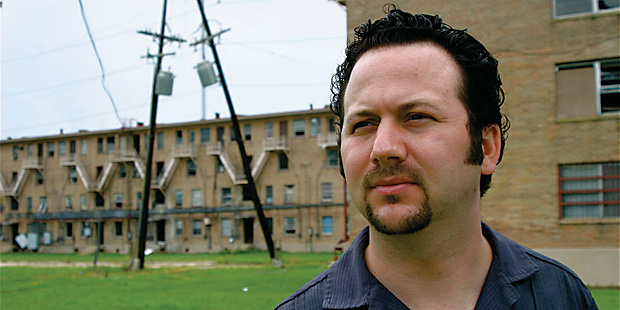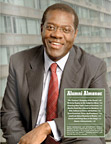Breakdown on the Bayou
Billy Sothern chronicles life in post-Katrina New Orleans.
Printer Friendly VersionNative New Yorker Billy Sothern ’01 became acquainted with New Orleans as a summer associate at a capital defense nonprofit agency, where he worked alongside idealistic lawyers and activists from around the world. Seeing the government’s indifference to the abject poverty and racism in the city through the eyes of his non-American colleagues, he became convinced that he could do meaningful work in New Orleans and adopted the city as his home upon graduation.
Four years later as Hurricane Katrina approached, a reluctant Sothern and his wife left for Oxford, Mississippi, where they watched the suffering and devastation on television as thousands of residents, most of them poor, black and elderly, were abandoned and left to die in the rising waters. The nation was shocked to see images of New Orleans that compared to third-world countries, but Sothern responds that the “city had long displayed such signs to anyone who cared to look at them.”
Returning to his pre-Emancipationera home less than two months after the storm, Sothern began writing a series of essays that were published in The Nation, Paris Review, Salon and elsewhere. In 2007, those and new essays were assembled into Sothern’s first book, Down in New Orleans, which he describes as “an interrogation of the conservative notion that a government which governs least, governs best.” In this first-person account of the year following the storm, Sothern lays bare the federal government’s failures in response to the disaster, and ties in the myriad racial and social-justice issues that continue to plague the city.
Now the director of the Capital Appeals Project, Sothern represents death-row inmates from across Louisiana in trial and post-conviction appeals. In Louisiana v. Kennedy, which went before the Supreme Court in April, Sothern’s office directed Patrick Kennedy’s appeal and served as cocounsel in the case. Sothern was also recently awarded a Soros media fellowship to write his next book, Put Childish Things Away, about unfair prison sentencing.
Senior Writer Graham Reed spoke with Sothern about his first book, Down in New Orleans, and life as a New Orleans resident three years after Hurricane Katrina.
Your book reads like a catharsis. Why treat this national tragedy so personally? I was a part of the story, so to disengage that would be to tell only half of it. Besides, my vantage point as a lawyer provided a lens to view the broader social-justice issues in the city.
How has your work changed as a result of Katrina? The storm and its exposure of the wholesale failure of the government to address the needs of people widened my sense of mandate to write not only about what I know as an attorney, but to look at other issues—public housing, urban poverty—that impact my clients’ lives.
Your description of the poverty and racism is overwhelming. How do you stay hopeful that things can be improved? I believe that what people saw in New Orleans was horrifying to them. I hope the disaster was the pendulum’s apex for governance that leaves the weakest to fend for themselves under difficult circumstances.
Are you still committed to calling New Orleans your home? My wife and I have this big old falling-over place that we’ll be fixing up for the next 25 or 30 years. I’d no sooner leave New Orleans than anyone would their home in a time of great need.
—

